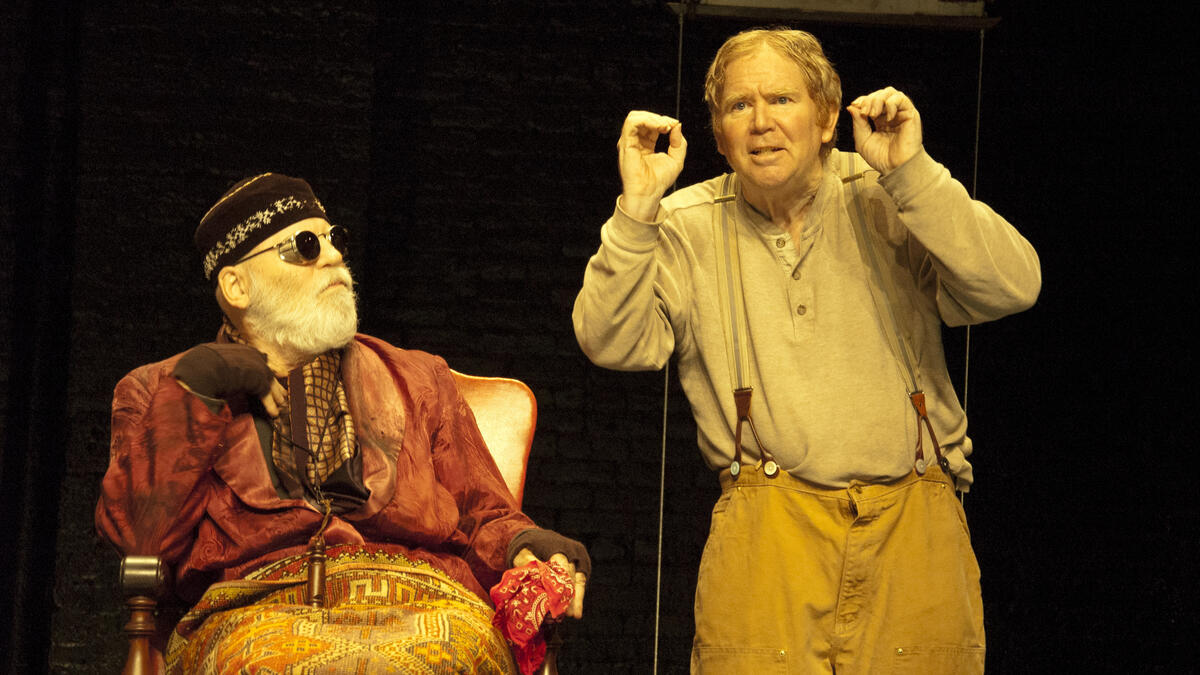There are 5 million Americans living with Alzheimer’s, 1 million with Parkinson’s and nearly half a million with multiple sclerosis. And with an aging U.S. population, it’s likely those numbers will increase, making learning how to live with such neurodegenerative diseases essential.
This week an event organized by Patrick Bixby, associate professor of English at Arizona State University, will showcase how two veteran actors have been doing just that, with a special preview screening of a film that documents their daily trials with Parkinson’s disease while continuing to do what they love. The screening will bring together health care providers, university faculty, potential donors and other stakeholders at 6 p.m. Thursday, April 6, at the Beus Center for Law and Society on the Downtown Phoenix campus.
“The Endgame Project” follows Dan Moran and John Christopher Jones as they put together an off-Broadway production of Samuel Beckett’s tragicomedy play “Endgame,” an already demanding task, while also contending with physical therapy, doctor visits and medication regimens.
“Their story offers encouragement and insight for the growing number of people directly impacted by Parkinson’s disease,” said Bixby, who works in the New College of Interdisciplinary Arts and Sciences, “and, just as important, it provides the general public with a model for understanding and appreciating those with neurodegenerative conditions.”
Neurodegenerative diseases are characterized by the progressive degeneration of brain cells that make normal functions like physical movement and memory increasingly difficult. They are incurable. Parkinson’s in particular affects posture and balance, automatic movements and facial expressions, speech cadence and voice inflection — tools that are indispensable to actors.
As fate would have it, Moran and Jones, who had known each other since sharing a dressing room on a Broadway play in 1995, were diagnosed with the disease at nearly the same time, more than a decade ago. Both were determined to go on working at their craft but watched as opportunities dwindled upon making their diagnoses public — until Moran rediscovered an old copy of Beckett’s “Endgame.”

The characters in the two-man play resonated with him anew: one is described as having a stiff, shuffling gate, while the other is blind and uses a wheelchair. Moran pitched the idea of performing the play to Jones, who readily signed on.
“The diminished circumstances of the characters, along with their persistent desire to go on, felt to Dan like his own circumstances, confined to a body that would no longer do what it once could,” Bixby wrote in an article about the project. “The play not only spoke to their circumstances, it presented them with new opportunities. Who could understand these characters better? Who could embody these characters more fully? Suddenly, their symptoms were no longer obstacles to their work; they were integral to it.”
The film screening will be followed by a Q&A session with Moran and Jones. The next day, both actors will also visit the Muhammad Ali Parkinson Center at the Barrow Neurological Institute to discuss their experiences and share their insights with patients and health care providers.
Darolyn O’Donnell, recreation therapy coordinator for the Ali center, said the center recognizes the role arts can play in coping and healing with diseases like Parkinson’s, and offers dance, painting and music classes.
“We focus on what you can do … on independence and maintaining quality of life,” she said. “These actors are living proof” that it can be done.
The culmination of “The Endgame Project” events will be the creation of the Network for Arts, Humanities, and Neurodegenerative Care, an online network where Parkinson’s patients, their families, caregivers, health care professionals and members of the community can connect to foster innovative partnerships and activities.
David Coon, associate dean and professor at ASU’s College of Nursing and Health Innovation, who provided support for the event, said he expects it will broaden people’s views of living with a disease.
“I think it will help folks see from multiple perspectives about how someone else faces the journey and engages with life and works to maintain a quality of life across a chronic illness,” he said.
To attend the film screening, register here. Find additional information, including a map, here. For more information about the meet-and-greet with the actors at the Muhammad Ali Parkinson Center, call 602-406-4931.
Top photo: Dan Moran as "Hamm" (left) and John Christopher Jones as "Clov" in a production of Samuel Beckett's "Endgame." Photo by Peter Angelo Simon.
More Health and medicine

College of Health Solutions alumnus named Military Medic of the Year
By Keri Hensley and Kimberly LinnJonathan Lu has looked out for the health of his fellow military service members his whole career, starting with his role as a combat medic in the U.S. Army.Driven by…

ASU, Mayo Clinic forge new health innovation program
Arizona State University is on a mission to drive innovations that will help people lead healthier lives and empower health care professionals to develop novel new health solutions. As part of that…

Innovative, fast-moving ventures emerge from Mayo Clinic and ASU summer residency program
By Georgann YaraIn a batting cage transformed into a custom pitching lab, tricked out with the latest in sports technology, Charles Leddon and his Mayo Clinic research teammates scrutinize the…
